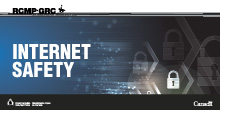
|
What is Cyberstalking? |
| Cyberstalking is an Internet-related term that’s used to describe someone who’s stalking, threatening and/or harassing another person online. To the victim, it can be a traumatizing and frightening experience. |
|
It Isn't a Prank |
| Threatening or harassing email should never be excused as a prank. Threats should always be taken seriously. It is dangerous to dismiss threatening email, believing the threats will never be acted upon. Remember that threatening or harassing someone through email is just as illegal as doing so in an offline form. |
|
What Can Be Done? |
|
Protecting yourself on the Internet should begin by trying to keep any information about yourself confidential. You should avoid giving out more information than necessary, and never tell someone highly personal information, including:
Be aware that while you’re being honest about yourself, others you communicating with over the Internet may not be telling the truth about themselves. This deception is done to make the victim feel at ease. By making you feel that the two of you have things in common, there is a greater chance that you’ll be willing to exchange photos and/or information. If you don’t wish to receive electronic messages from someone, then send the person a message saying that you don’t wish them to send any additional messages or contact you in any way. This will let the person know that you didn’t appreciate their behaviour, and give them the chance to stop. Often this is enough, but if you continue receiving harassing messages or threats from them, then don’t reply to them. Consider contacting the police. If you receive any messages that make you uncomfortable, (through email, chat, etc.), but don’t feel threatened or the need to call the police, it is possible to block that person from sending you any other messages. Many apps allow you to filter messages or add certain people to an ignore list, blocking them from contacting you. |
|
Don't Destroy the Evidence |
| Any threatening or harassing email should not be deleted. Remember that this is the evidence that may be used to find and convict the person sending these messages. Police may wish to analyze them for further information. |

The Niagara Regional Police Service provides numerous external resources on online safety: niagarapolice.ca/onlinesafety.
The RCMP's has helpful information on:
•Bullying and cyberbullying
•General internet safety
•Child exploitation
•Online scams/frauds
•Protecting your information online

 I'd Like To
I'd Like To





 Subscribe to this Page
Subscribe to this Page